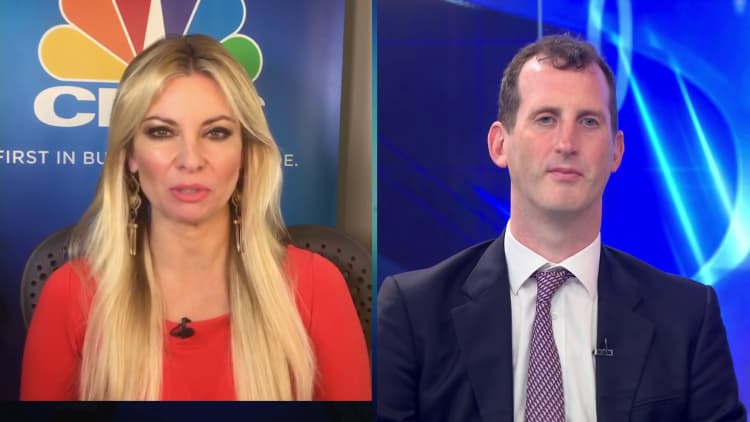
Residential buildings under construction at the Phoenix Palace project, developed by Country Garden Holdings Co., in Heyuan, Guangdong province, China in September 2023.
Bloomberg | Bloomberg | Getty Images
BEIJING — China’s state-directed economy may be creating the conditions for a new wave of bond defaults that could come as soon as next year, according to an S&P Global Ratings report released Tuesday.
It would be the third round of corporate defaults in about a decade, the ratings agency pointed out.
It comes against a backdrop of extremely few defaults in China amid concerns about overall growth in the world’s second-largest economy.
“The real thing to watch for policymakers is whether the current directives are creating distorted incentives in the economy,” Charles Chang, greater China country lead at S&P Global Ratings, said in a phone interview Wednesday.
China’s corporate bond default rate fell to 0.2% in 2023, the lowest in at least 8 years and far below the global rate of about 2.6%, S&P data showed.
“To a certain extent this is not a good sign, because we see this divergence as something that’s not the result of the functioning of markets,” Chang said. “We’ve seen directives or guidance from the government in the past year to discourage defaults in the bond market.”
“The question is: When the guidance to avoid the defaults in the bond market [ends], what happens to the bond market?” he said, noting that’s something to watch out for next year.

Chinese authorities have in recent years emphasized the need to prevent financial risks.
But heavy-handed approaches to tackling problems, especially in the real estate sector, can have unintended consequences.
The property market slumped after Beijing’s crackdown on developers’ high reliance on debt in the last three years. The once-massive sector has dragged down the economy, while the property sector shows few signs of turning around.
Real estate led the latest wave of defaults between 2020 and 2024, according to S&P. Prior to that, their analysis showed that industrials and commodity firms led defaults in 2015 to 2019.
“The bigger issue for the government is whether the real estate market can stabilize and property prices can stabilize,” Chang said. “That can potentially ease off some of the negative wealth effects that we’ve been seeing since the middle of last year.”
Much of household wealth in China is in real estate, rather than other financial assets such as stocks.
Economic growth concerns
Bond defaults dropped in most sectors last year except for tech services, consumer and retail, S&P found.
“That flags potential vulnerabilities to the slowing growth we’re seeing right now,” Chang said.
China’s economy grew by 5.2% last year, and Beijing has set a target of around 5% in GDP growth for 2024. Analysts’ forecasts are generally near or below that pace, with expectations for further slowdown in the coming years from the double-digit growth of past decades.
Large levels of public, private and hidden debt in China have long raised concerns about the potential for systemic financial risks.
China’s debt problems, however, are not as pressing as the need for Beijing to address real estate issues in a broader “comprehensive strategy,” Vitor Gaspar, director of the fiscal affairs department at the International Monetary Fund, said at a press briefing last week.
He said other aspects of the strategy are China’s emphasis on innovation and productivity growth, as well as the need to strengthen social safety nets so that households will be more willing to spend.
It remains to be seen whether other sectors can offset the property sector’s drag on the economy, and bolster growth overall.
UBS on Tuesday upgraded MSCI China stocks to overweight due to better corporate earnings performance which are not affected by property market trends.
“The largest stocks in the China index have been generally fine on earnings/fundamentals. So China underperformance is purely due to valuation collapse,” Sunil Tirumalai, chief GEM equity strategist at UBS, said in a note. “What makes us more positive now on earnings are the early signs of pick up in consumption.”
The bank also upgraded its outlook on Hong Kong stocks.
On why UBS’s changed its view on China valuations, Tirumalai pointed to a “growing trend of China companies giving positive surprise on dividends/buybacks.“
“This higher visibility of shareholder returns can be useful if global markets get more worried on geopolitics, and in higher-for-longer scenarios. We would keep an eye on the next leg of market reforms,” he added.







